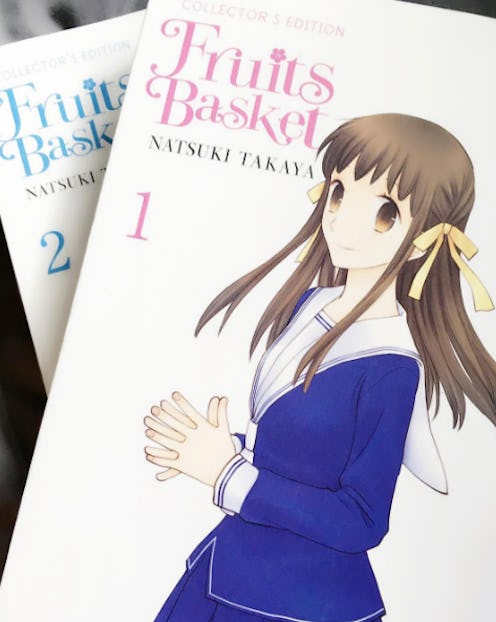Books
Fruits Basket Is Back And Reminding Me To Be Kind

There are many unfortunate divisions in the world, within which people stand obstinately on one side of an issue of two or more sides: you have Democrats and Republicans; you have tops and bottoms; you have people whose toilet paper orientation is over and people whose is under. And finally, you have people who like manga and people who don't. In this case, we'll be talking briefly about the last group in a discussion about how the manga series Fruits Basket reminds me to be kind.
What's sad about this division between manga lovers and non-lovers is that people really miss out on something wonderful by making decisions about something they may not have even given a real chance in the first place. I mean really, how many people do you know that tried manga and couldn't find a single redeeming thing about it? In our rapidly moving, consumer society, we have so many options and such easy and fast accessibility that we can basically just keep getting all the things we want without ever having to try anything new. What I mean is, it's totally possible to ignore entire cultures of food, websites and magazines that don't share our exact views, and genres of TV, film, and books because we can curate and control our lives so easily.
For those of you who may have already recognized this, agree with this, and/or feel some type of way, there is an extraordinary manga that has a simple message that this world, as we always say, needs to hear more often: be kind. This manga is called Fruits Basket.
For those of you who may have already recognized this, agree with this, and/or feel some type of way, there is an extraordinary manga that has a simple message that this world, as we always say, needs to hear more often: be kind. This manga is called Fruits Basket.
Don't let the title fool you. Fruits Basket has little to do with fruit, aside from a poignant reference in the story's early chapters. In short, without any spoilers, the story follows a girl named Tohru Honda, who is living on her own in some unusual circumstances after the sudden, tragic death of her mother. She meets some similarly unusual, yet attractive, charming, and mysterious people who pull her into an enchanted world that is magical enough to be fun but not so magical that it loses a sense of reality or has fairies, wizards, and dwarves. To be a little less vague, she meets the Sohma family, whose curse turns them into a specific (and adorable) member of the Chinese Zodiac when hugged by a member of the opposite sex. It's funny, heartbreaking, inspiring, odd, and romantic, all at once.
What makes this manga special, among thousands of competitors, is that it doesn't fall into or use any stereotypical anime and manga tropes. The women are not sexualized or stereotyped or damseled. The women in Fruits Basket are strong, thoughtful, and fully realized. It makes sense that the manga would focus on women, seeing as though it falls in the Shōjo category of manga, which means it is written specifically for teenage girls. This, of course, is not true for all Shōjo manga, some of which are not so respectful or empowering.
One of the interesting things about Fruits Basket is that it actually finished publication a long time ago.
YenPress, a US-based graphic novel (and anime) publisher, published the following statements on their site on the re-release of Fruits Basket in North America:
"One of the bestselling properties in the history of the North American manga market, Fruits Basket will be returning to bookstores next Spring, having been out of print for nearly half a decade.
...
VP and Publishing Director of Yen Press, Kurt Hassler, had this to say about the agreement, which was brokered through the Tuttle-Mori Agency: “It would not be an exaggeration to say that the original publication of Fruits Basket had a transformative effect on comics culture in this market.Fruits Basket, along with a handful of other properties, welcomed female readers to a medium and an industry that had too long ignored them, introducing a generation of readers and future creators and professionals to comics, and the reverberations of that impact continue to reshape comics today. We are delighted that Takaya-sensei and Hakusensha have seen fit to entrust us to reintroduce Fruits Basket into North America..."
In a story about a magical curse and love, what arguably shines the brightest throughout the series is its heroine (or shero) that I previously mentioned, Tohru. Her mantras and thoughts about identity are truly insightful, and her selflessness, work ethic, and commitment to kindness are a cross between touching and poignant, particularly given how cruel we've accepted the world to be and how we all consciously and unconsciously participate in it from time to time.
I'm not here to sell you this manga or tell you definitively that it's better than the rest or that it'll make you want to read other manga. I'm just here to share a story that encourages kindness above all else because there's not enough of that right now. In a world where gore, death, torture porn, sex, violence, stereotypes, and drama sell the most, Fruits Basket proves that nice things sell too (and that they're worth every penny).
Check out YenPress for the list of retailers selling the Fruits Basket Collector's Edition series.
Images: abilikespizza/Instagram